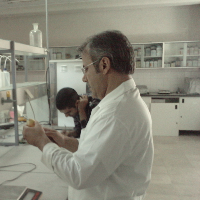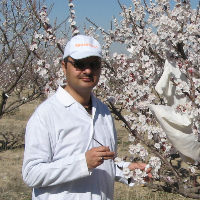Comparison of the storage effect of straw and some ethylene absorbents in apricot fruit packaging
The annual production of apricots in the world in 2017 amounted to about 4/257/241 tons, and among these, Iran with a production of 239/712 tons, is ranked fifth after Turkey, Uzbekistan, Italy and Algeria. While in 2010, Iran was the second largest apricot producer in the world after Turkey with a production of 388/049 tons of apricots (Meltam and Mevlut 2020). Apricot fruit has different cultivars that are either eaten fresh such as Germez-Shahrood and Aybatan 90 cultivars or like Maraghei 90, Ordoobad, Nasiri and Asgarabad cultivars are processed and then consumed. Apricot is one of the climacteric fruits and produce a lot of ethylene when the fruit ripens. Apricots are very sensitive to the presence of ethylene. In apricot storage space, the presence of very low amounts of ethylene in the range of 0.03 - 0.1 µL/ L will damage this fruit (Martinez-Romero et al., 2007). Therefore, evacuation of ethylene from the empty packaging space will slow down the aging process and extend the shelf life of apricot (Ozdemir and Floros 2004). Ethylene absorbers are divided into several categories. Natural clays (Zeolite and Bentonite), catalytic oxidants (Potassium permanganate, Potassium dichromate and Palladium), regenerative absorbers (Propylene glycol and Xylene glycol), electron-deficient dienes or trienes (Benzene and Pyridines) and other absorbers such as Active carbon and Aluminum oxide (Gaikwad et al., 2020). Ethylene absorbers have been used to increase the shelf life of climacteric fruits such as apricot, apple, banana, mango, cucumber, kiwifruit, tomato, avocado, persimmon and vegetables such as carrot, potato, and asparagus (Ozdemir and Floros 2004 and Yildirim et al., 2018). In this study, in addition to ethylene adsorbents such as Bentonite, Active carbon, and Potassium permanganate that were commonly used or researched. Straw was used for the first time as an absorber. From ancient times, straw has been used to store fruits such as grapes and watermelons in rural areas of Iran. Therefore, its use in apricot storage was investigated.
Materials used in this study include: apricots with cultivars of Aybatan 90, Maraghei 90, Asgarabad and Germez-Shahrood. Ethylene absorbers include bentonite, active carbon and potassium permanganate were obtained from local markets. To prepare the straw, wheat stalks were crushed using a shredder. Low density polyethylene (LDPE) film was used to cover the packaging. After packing, apricots were stored at 1°C and tested every 4 days for 16 days. The evaluated parameters in this study were TSS, pH and firmness.
According to the obtained results, the amount of TSS will be affected by cultivar and type of ethylene absorbers. The result showed that Maraghehei 90 cultivar had the highest TSS and Aibatan 90 cultivar had the lowest TSS compared to other cultivars. The effect of ethylene absorbers on the TSS showed, treatment without ethylene absorber had the greatest effect on TSS and treatments with ethylene absorber of potassium permanganate and active carbon had the least effect on increasing TSS. Finally, the effect of ethylene adsorbers on TSS was small according to the data of this study. Researchers reported that the differing views exist on the effect of ethylene absorbers on the TSS attribute. Valdes et al., (2009) and Palo and Crisosto (2003) stated that TSS will not be affected by ethylene and ethylene removal will not have a significant effect on this trait. In contrast, Zhou et al., (2006) reported peach and Bregoli et al., (2005) reported that the presence or absence of ethylene would affect the TSS trait. Regarding the pH trait, Maraghei 90 cultivar showed the highest and Aybatan 90 cultivar showed the lowest pH. The pH will increase in relation to increasing of fruit shelf life. Maraghehei 90 cultivar with packaging without ethylene absorber showed the most effect on increasing the pH and Aibatan 90 cultivar with ethylene absorber potassium permanganate showed the least effect on increasing the pH. According to these results, ethylene absorbents had a little or no effect on pH. Researchers have offered different views on the pH attribute as well as the TSS attribute. Overall, the researchers believe that the effect of ethylene absorbers on the pH trait is minor. Ishaq et al., (2009) stated that the use of potassium permanganate slowed the decrease of TSS and decreased the amount of pH in apricot fruits. Emadpour et al., (2015) obtained that the effect of coated potassium permanganate on zeolite nanoparticles on pH changes of peach and nectarine fruits was low. Other fruits such as kiwi (Ramin et al., 2010), tomato (Salamanca et al., 2018) and banana (Tourki et al., 2014) have similar results in comparison with apricot fruits. The results obtained on the firmness property showed that it can be influenced by cultivar, time and ethylene absorber. Maraghehei 90 cultivars had the firmest value and germez-Shahrood cultivar had the softest texture. The result showed that with increasing shelf life, firmness had a decreasing trend. The effect of interaction between cultivar and time on firmness, it was observed that Maraghehei 90 cultivar had a firmer texture on the fourth and eighth days than other treatments. Germez-Shahrood cultivar on the 16th day, had the lowest texture firmness. Based on the data, apricot fruits treated with ethylene absorbers of potassium permanganate and carbon active represented the highest firmness and the effect of straw and bentonite on fruit firmness did not show a significant difference. The use of ethylene absorbent treatments resulted in longer shelf life of apricot fruits, regardless of cultivar. Ethylene absorbent for potassium permanganate reoresents different effects depending on the product and even the cultivar. In general, this absorbent can be delay the processing and related processes of chlorophyll decomposition and color, weight loss and firmness (Alvarez-Hernandez et al. 2019). Climacteric fruits such as nectarines and peaches are sensitive to loss of firmness with increased ethylene production. The use of nano absorbent granules effectively reduced the softening process of tissue (Emadpour et al., 2015). Valdes et al., (2009) reported that fruit firmness is dependent on ethylene content consequently fruit firmness was progressively decreased with increasing ethylene, as well as, the use of ethylene absorbents delays mentioned softening of climacteric fruits. Similar results were obtained for other climacteric fruits such as apple (Sardabi et al., 2014), avocado (Corrêa et al., 2010), banana (Tirgar et al., 2018), blueberry (Wang et al., 2018) and dates (Mortazavi et al., 2015).
Industrial cultivars such as Maraghehei 90 and Asgarabad were more durable than fresh-eaten cultivars such as Germez-Shahrood and Aybatan 90. Industrial cultivars showed higher shelf life due to higher TSS and consequently higher sugar content than fresh-eaten cultivars. Ethylene absorbents had little or no effect on TSS and pH. Firmness was influenced by apricot cultivar, ethylene absorber and time. With increasing time, the value of firmness decreased and using ethylene absorbers regardless of cultivar type reduced the softening. Potassium permanganate showed the greatest effect on fruit firmness and increased the shelf life of apricots compared to other ethylene absorbers. Maraghehei 90 cultivar does not need to use ethylene absorbents to increase its shelf life, because it has an inherently high shelf life due to its high sugar content. Straw has the good potential in order to store apricot fruits, but it requires further research.
-
Investigating the Effect of Different Combination Strategies of Hot Air and Infrared Radiation on Apricot Drying
Mansoureh Mozaffari *, Hossein Ghaffari Setoubadi, Hamid Reza Gazor,
Agricultural Research, Education and Extension Organization, -
Sahand 97, the new late ripen cultivar of apricot suitable for processing, storing and transport
H. Rahnemoun *, R. Ghare Sheikh Bayat, E. Ganji Moghadam, J. Dejampour, H. Fathi, M. Zarrinbal, A. Bybordi, H. Mohammadi Mazraeh, J. Soleimani, A. Shahnavazi, M. Mohammadypour, S. M. Tabatabaee, H. Moslemi, T. Azarinejad, P. Zargaripour, A. Iravani, S. Bina
Research Achievements for Field and Horticulture Crops, -
Nut and Kernel Characteristics of Some Almond Cultivars and Genotypes in Northwest of Iran
MOHAMMAD ZARRINBAL*, HOSSEIN FATHI, JALIL DEJAMPOUR, SEYED ALI MOUSAVI ZADEH
Journal of Horticultural Science and Technology, -
Investigation of Technical Performance and Efficiency of Different Backpack Sprayers on Onion Thrips Control
Mansoureh Mozafari *, Mohammadreza Yousefzadeh, Jaber Soilemani
Journal of Agricultural Mechanization,




